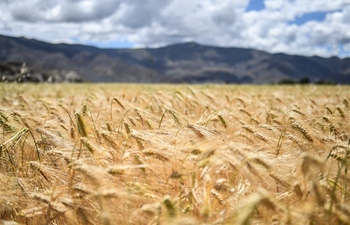NAIROBI, Aug. 31 (Xinhua) -- Plastic water pipes, bags of cement, floor and wall tiles, kitchen sinks and wooden doors are some of the items displayed outside many shops in Kitengela, a fast-growing suburb south of Kenya's capital Nairobi.
Looking at the items as one strolls in the suburb, one may think that the whole area is under construction.
But this is the norm in most suburbs across Nairobi and the east African nation. The business has become the most popular in Kenya, including in rural areas, fanned by a thriving construction sector and ready imported items from China.
The latter has injected new life in the business that in yesteryears was in the hands of a few individuals.
The affordable Chinese-made construction materials have enabled many join the trade amid a booming real estate sector.
Taps, hammers, saws, tiles, water pipes, sinks, doors, locks, ceiling boards, nails and electrical materials are some of the popular items sourced from China.
"This is a good business because the market is there and affordable prices of the Chinese wares make the goods move faster," Edward Mugo, who owns a construction items shop in Kitengela, said in a recent interview.
Mugo sources the items for sale from shops in Nairobi's Industrial Area, where there are several dealers who import them from China.
"The Chinese items have really revolutionized this industry and brought business in our hands," said Mugo who has been in the business for four years.
Initially, most of the items used to be imported from Europe and India. "But we never had plastic water pipes for instance. The plastic pipes from China have now taken over the market because they are not only affordable but also long-lasting and are not prone to rust," he said.
He sells a five-meter water pipe at 650 shillings (6.3 U.S. dollars), around half the cost to buy the same-length steel water pipes.
Besides the pipes, he isolates plastic taps as other products from China that have addressed the local Kenyan realities.
"Residents in this area and many others in Nairobi use saline water from boreholes which corrodes metal taps over time. Plastic taps, gate valves and other related items from China are therefore very popular with home owners," he said.
One needs between 3,500 dollars and 5,000 dollars to start a construction items shop, noted Mugo but acknowledged competition is tough in the sector.
"With so many shops around, you really need to stand out by selling diversified items to attract customers," he said.
Joseph Kitilu, who sells only bathroom and kitchen construction wares, noted the affordable imported items helped him specialize.
"There are people who have specialized in tiles, others on doors and locks while myself on pipes and taps and related items. The business opportunities are huge," he said in phone interview.
Kenya's construction sector grew by 5.6 percent in the first quarter of this year, a slight decline compared to a growth of 6.6 per cent in the corresponding quarter of 2018, according to the Kenya National Bureau of Statistics (KNBS).
However, the value of imported construction related materials rose to 122 million dollars in the first three months of this year, up from 70 million dollars in a similar quarter in 2018, KNBS data shows.
Ernest Manuyo, a business management lecturer at Pioneer Institute in Nairobi, observed that the affordable items from China now drive Kenya's construction sector.
"The fact that they are readily available and affordable gives builders power to access them. They have certainly helped stabilize construction costs as prices of things like sand and stones rise," he said.
According to him, the Chinese have studied and understood the African market, enabling them to deliver items that meet needs of local people.













